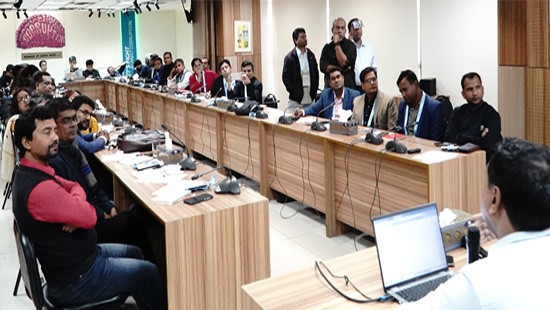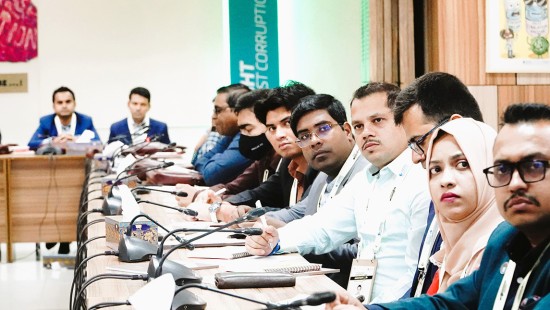Published: 14 May 2024

According to a study conducted by Transparency International Bangladesh (TIB), the Green Climate Fund (GCF) has deviated from its initial goals and now focuses more on providing loans rather than grants. "Accessing Green Climate Fund for Vulnerable Countries Like Bangladesh: Governance Challenges and Way Forward" titled study also indicates that, the GCF has imposed strict conditions that have severely limited the access of developing countries like Bangladesh to get the funding.
Additionally, the research reveals that, Bangladesh requires a minimum investment of USD 12 billion from both domestic and international sources by 2025 in order to effectively address the negative consequences of climate change. However, only 9.9% of the country's needs have been met with a total of USD 1189.5 million approved for Bangladesh from national and international sources.
Furthermore, the study found that, GCF has been sluggish in disbursing funds and has deviated from its original objectives by prioritizing loans over grants. Just 13.3% of the approved funds have been distributed. The initial disbursement of funds experienced a three-year delay in the project. The project implementation was significantly hindered due to the delayed disbursement of the fund, which further worsened climate vulnerabilities in the project areas. Although, GCF is widely recognized as the primary global source of climate funding for developing countries and its main objective is to mobilize the climate finance that has been pledged by developed nations.
This study also signaled that, bypassing country ownership priorities and defying its own targets, the GCF allocates more funds for mitigation than adaptation and prioritizes loans over grants. From 2015 to 2023, a significant portion of the GCF finance was allocated as loans, which has added to the financial strain on climate-vulnerable nations like Bangladesh which is also contradictory to ‘polluters-pay principle’. For this, GCF was unable to achieve a balanced distribution of 50:50 proportions for adaptation and mitigation. The study also pointed out the inefficient implementation plan of GCF, which has resulted in Bangladesh not receiving the expected amount from global funds, despite being one of the nations that are most susceptible to the effects of climate change.
The study also brings attention to the biased nature of the GCF financing practices, where more funds are allocated to international and regional organizations such as the UNDP, the IDB, the ADB, and the EBRD rather than national agencies of vulnerable countries. TIB sees this biased policy as unacceptable and contradictory to GCF’s core mandate. The study further mentioned that against the annual adaptation demands of US $215 to US $387 billion by 2030 for vulnerable countries, the fund has only approved US $5.9 billion since 2015, indicating a significant gap between expectations and GCF delivery.
According to Dr. Iftekharuzzaman, the Executive Director of TIB, “the performance of GCF is both disappointing and discriminatory. GCF was established with the aim of providing financial assistance to countries that are vulnerable to climate change”. He also added that, “GCF claims to have a zero-tolerance approach towards corruption, but according to the study's findings, they are not adhering to their own policy and are actually enabling corruption. The discovery of corruption in certain projects funded by UNDP's GCF, the organization has committed to taking action against the institution and decided to renew its accreditation”.
The GCF also lacks in providing adequate support to develop the competence and expertise of Nationally Designated Authority (NDAs). Consequently, aspiring Direct Access Entities (DAEs) struggle to obtain prompt accreditation and secure funding to pursue their projects in accordance with their priorities and requirements. In this connection, the study reveals that between 2015 and 2023, GCF allocated US $13.5 billion for 243 projects, but released only US $3.8 billion. Though, DAEs should be responsible for implementing the majority of GCF projects in order to ensure a country-driven approach and leadership from vulnerable nations. The reality, however, is quite the opposite.
The GCF has a role to act as a catalyst for delivering the climate finance, but the GCF has poor funding status and lacks of proper strategy to raise funds. In this backdrop, the study provided 15 recommendations for GCF and concerned stakeholders and also came up with eight recommendations for Bangladesh government and relevant stakeholders, which included increasing NDA's technical capacity and create a permanent and specific position for officials concerned in NDA's organogram to manage GCF activities, and the government should increase grants and technical support to improve the capacity of national organizations to enhance direct access to GCF.
For the full report, presentation, and other documents, visit - https://ti-bangladesh.org/articles/research/6981







